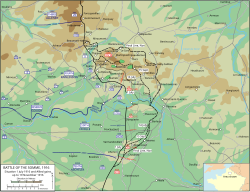| Leipzig Salient | |||||||
|---|---|---|---|---|---|---|---|
| Part of The Battle of the Somme, First World War | |||||||
 Battle of the Somme 1 July – 18 November 1916 | |||||||
| |||||||
| Belligerents | |||||||
|
|
| ||||||
| Commanders and leaders | |||||||
| Douglas Haig | Erich von Falkenhayn | ||||||
Leipzig Salient | |||||||
The Leipzig Salient was the British term for a German defensive position built in 1915 on the Somme in France, during the First World War, opposite the village of Authuille which contained the Leipzig Redoubt on its west face. The position was to the south-west of the site of the later Thiepval Memorial, north-east of the La Boisselle–Authuille and Thiepval–Aveluy crossroads. The German front line bulged around a quarry which the Germans fortified and enclosed with Hindenburg Trench, across the chord of the salient. A redoubt named the Wundtwerk (Wonderwork to the British) lay beyond, on a reverse slope. Nab Valley lay on the east side, Thiepval was to the north, with the fortified Mouquet Farm and the village of Pozières to the north-west.
On the First day on the Somme (1 July 1916), the Leipzig Salient was attacked by the 1/17th Highland Light Infantry (17th HLI) of the 32nd Division. The battalion crept forward at 7.23 a.m., ready to rush the German defences as soon as the British barrage lifted at 7:30 a.m. The Scots advanced until 30–40 yd (27–37 m) short of the German front line, rushed the redoubt when the barrage lifted and caught the German garrison sheltering in their quarry dugouts at the centre of the redoubt. The 17th HLI pressed on to the next objective but were forced back to the Leipzig Redoubt and consolidated with parties of the 2nd King's Own Yorkshire Light Infantry.
The 17th HLI was joined at the redoubt by parties of the 11th Border Regiment, 1st Dorset Regiment and the 19th Lancashire Fusiliers (3rd Salford Pals) during the day and the 17th HLI was withdrawn overnight. British and German attacks at the salient continued during July, when the Reserve Army divisions north of the Albert–Bapaume road reverted to trench warfare, in which the 32nd Division, 25th Division and the 49th (West Riding) Division (X Corps) occupied Leipzig Redoubt in turn during the rest of the month.
The divisions were to push forward to improve their positions and to prevent the Germans from withdrawing troops for operations against the Fourth Army to the south. Both sides made costly attacks but could rarely consolidate gains before being forced out by counter-attacks. Intermittent operations at the Leipzig Salient continued as part of the Battle of Pozières (23 July – 3 September) and the Battle of Thiepval Ridge (26–28 September), when the Thiepval Spur was captured by the 18th (Eastern) Division.
